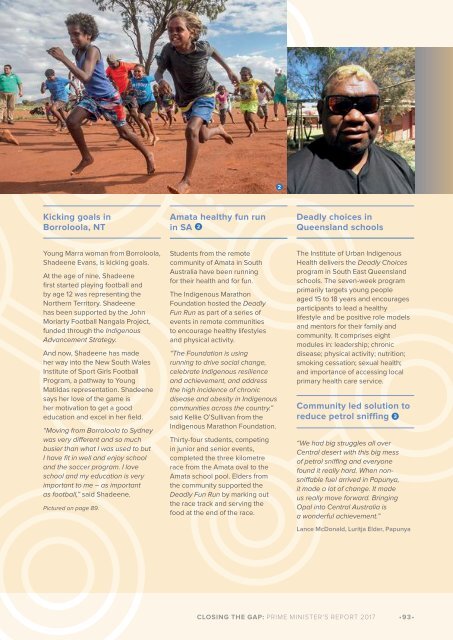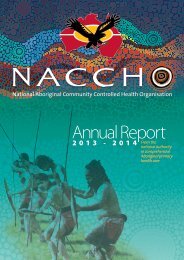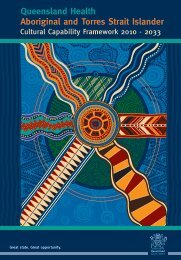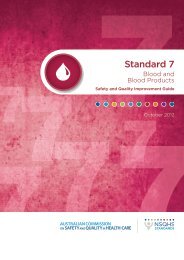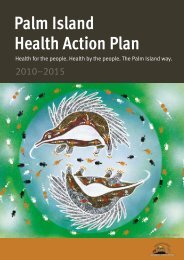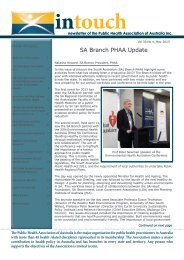CLOSING THE GAP
ctg-report-2017
ctg-report-2017
Create successful ePaper yourself
Turn your PDF publications into a flip-book with our unique Google optimized e-Paper software.
2<br />
3<br />
Kicking goals in<br />
Borroloola, NT<br />
Amata healthy fun run<br />
in SA 2<br />
Deadly choices in<br />
Queensland schools<br />
Young Marra woman from Borroloola,<br />
Shadeene Evans, is kicking goals.<br />
At the age of nine, Shadeene<br />
first started playing football and<br />
by age 12 was representing the<br />
Northern Territory. Shadeene<br />
has been supported by the John<br />
Moriarty Football Nangala Project,<br />
funded through the Indigenous<br />
Advancement Strategy.<br />
And now, Shadeene has made<br />
her way into the New South Wales<br />
Institute of Sport Girls Football<br />
Program, a pathway to Young<br />
Matildas representation. Shadeene<br />
says her love of the game is<br />
her motivation to get a good<br />
education and excel in her field.<br />
“Moving from Borroloola to Sydney<br />
was very different and so much<br />
busier than what I was used to but<br />
I have fit in well and enjoy school<br />
and the soccer program. I love<br />
school and my education is very<br />
important to me – as important<br />
as football,” said Shadeene.<br />
Pictured on page 89.<br />
Students from the remote<br />
community of Amata in South<br />
Australia have been running<br />
for their health and for fun.<br />
The Indigenous Marathon<br />
Foundation hosted the Deadly<br />
Fun Run as part of a series of<br />
events in remote communities<br />
to encourage healthy lifestyles<br />
and physical activity.<br />
“The Foundation is using<br />
running to drive social change,<br />
celebrate Indigenous resilience<br />
and achievement, and address<br />
the high incidence of chronic<br />
disease and obesity in Indigenous<br />
communities across the country.”<br />
said Kellie O’Sullivan from the<br />
Indigenous Marathon Foundation.<br />
Thirty-four students, competing<br />
in junior and senior events,<br />
completed the three kilometre<br />
race from the Amata oval to the<br />
Amata school pool. Elders from<br />
the community supported the<br />
Deadly Fun Run by marking out<br />
the race track and serving the<br />
food at the end of the race.<br />
The Institute of Urban Indigenous<br />
Health delivers the Deadly Choices<br />
program in South East Queensland<br />
schools. The seven-week program<br />
primarily targets young people<br />
aged 15 to 18 years and encourages<br />
participants to lead a healthy<br />
lifestyle and be positive role models<br />
and mentors for their family and<br />
community. It comprises eight<br />
modules in: leadership; chronic<br />
disease; physical activity; nutrition;<br />
smoking cessation; sexual health;<br />
and importance of accessing local<br />
primary health care service.<br />
Community led solution to<br />
reduce petrol sniffing 3<br />
“We had big struggles all over<br />
Central desert with this big mess<br />
of petrol sniffing and everyone<br />
found it really hard. When nonsniffable<br />
fuel arrived in Papunya,<br />
it made a lot of change. It made<br />
us really move forward. Bringing<br />
Opal into Central Australia is<br />
a wonderful achievement.”<br />
Lance McDonald, Luritja Elder, Papunya<br />
<strong>CLOSING</strong> <strong>THE</strong> <strong>GAP</strong>: PRIME MINISTER'S REPORT 2017<br />
•93•


